Ohmi Railway Hino Station & Other Sights
|
Title   • File Name • File Name   • Date • Date   • Position • Position   |
|
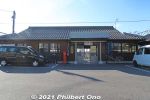
Ohmi Railways Hino Station building was completey renovated in 2017. Very impressive job. Other structures were also renovated including a small railway museum. Renovations were completed by May 2020. 近江鉄道 日野駅
|
|
|
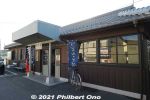
The building is now earthquake-resistant and painted dark brown. It now has a community space for a cafe, tourist information, and waiting room for passengers.
|
|
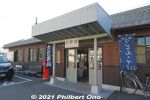
The canopy over the entrance was also renovated. It is supported by entasis columns.
|
|
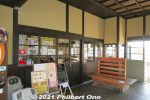
Hino Station's entrance hall. Not so many seats here, but there are benches on the platform. You can also wait inside the cafe on the left.
|
|
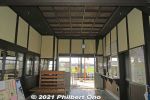
The ticket window used to be on the left corner. Now it's in the right corner. The exit goes to the train platform. The latticed ceiling came from the station's VIP room which was on the right side of the building.
|
|

Ticket window on the right (closed).
|
|
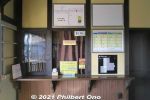
Ticket window (closed). This is new.
|
|
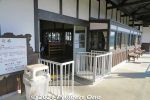
Turnstile
|
|
|
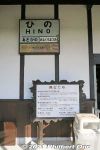
Old Hino Station sign has been in use since the Showa Period (ended in 1989). Displayed on train platform No. 1.
|
|
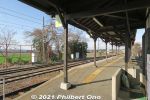
Hino Station train platform.
|
|

On Hino Station's train platform No. 1. Original wooden columns still usable are retained.
|
|
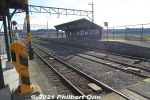
Hino Station has three sets of railway tracks, very rare. The unused middle track is vintage, made by Barrow Steel from the UK. Train platform No. 2 (for Yokaichi/Maibara) across the tracks has a roofed benches also renovated.
|
|
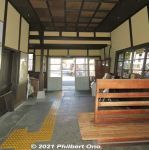
Entering the train building from the platform. Exit ahead.
|
|

Nanairo cafe menu.
|
|
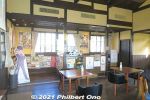
Hino Station now has a nice community space named "Nanairo" that serves as a cafe, tourist information space, and waiting room for passengers. Tourist pamphlets are on the left.
|
|
|
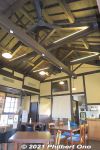
Nanairo cafe has a Western-style truss ceiling from the Taisho Period.
|
|

Friendly ladies wait on you for the food or drink. The clock seen on the right was actually used in the train station office.
|
|
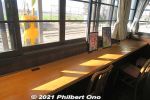
Counter seating has a view of the train platform.
|
|
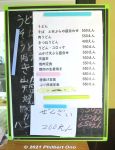
Cafe menu. Low prices. Udon, soba, and teishoku complete meals.
|
|
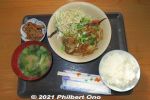
My teishoku lunch.
|
|
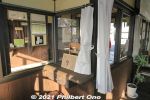
Old ticket window and counter have been retained.
|
|
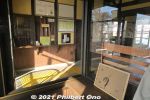
Old ticket window.
|
|
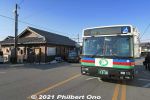
Outside the station is the bus stop for Omi-Hachiman Station.
|
|
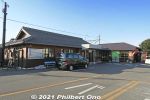
Hino Station (left) and the smaller building on the right used to be the tourist information office. It's now the Hino Station Railway Museum. 日野駅と日野駅鉄道資料展示室
|
|
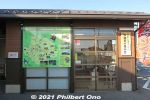
Hino Station Railway Museum. 日野駅鉄道資料展示室
|
|
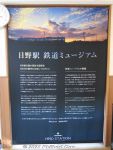
About the entire Hino Station being a "Railway Museum."
|
|

Inside Hino Station Railway Museum. History of the station on panels, and old train and station-related artifacts. No English captions.
|
|
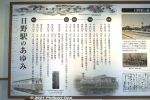
Chronology of the history of Ohmi Railways (founded in 1896) and Hino Station (first built in 1900).
|
|
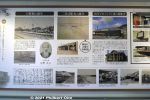
Upper left is a photo of Hino Station's opening day. The back of the station building can be seen. The building was rebuilt in 1916.
|
|
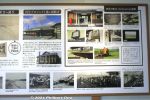
Remnants of the old days still remaining in the renovated Hino Station.
|
|
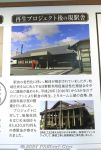
During the renovation, the entire train station building was jacked up to reinforce the foundation against earthquakes.
|
|
|
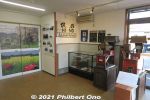
Many of the old artifacts on display can only be recognized or understood by hardcore train fans and people who worked at a train station. It's quite specialized.
|
|
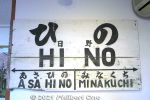
Old Hino Station signage.
|
|
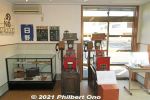
The red instruments are signalling block instruments for preventing collisions between trains. (タブレット閉塞器)
|
|

Implements used by Hino Station staff. Lower left is a paper ticket holder. Preprinted tickets were organized according to the destination.
|
|

L-R: Holder for rubber date stamps used to stamp the date on the ticket. Dating machine to imprint the date on the ticket. Clippers to cutout a small square on the ticket when boarding the train. Magneto telephone with a crank.
|
|
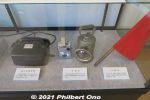
Magneto telephone with a crank (磁石式電話機), signal light, and red signal flag to signal the train.
|
|

On the left are old flyers advertising local businesses in Hino while mentioning Hino Station. Lower right is a roof ornament that has the old crest of Ohmi Railways.
|
|

Ad for a shipping company in front of Hino Station.
|
|
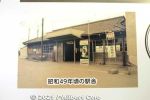
Hino Station in 1974.
|
|
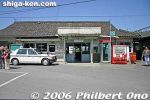
This is what Hino Station looked like before it was renovated in 2019. This old train station building was built in 1916.
|
|

Hino Station on the Ohmi Tetsudo railway before the building was renovated in 2019. On the right was the tourist info office. 近江鉄道 日野駅
|
|
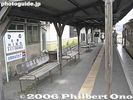
Hino Station platform on the Ohmi Testudo railway. 近江鉄道 日野駅
|
|

Inside Hino Station at night before the building was renovated in 2019. 日野駅
|
|

Hino Station platform at night. Old roof was replaced in 2019.
|
|

Minami Sanno Matsuri Festival is held annually on April 4 by Hieda Jinja Shrine in Okubo and Seon (大窪、清雲). 南山王の祭 Map
|
|

Minami Sanno Matsuri Festival is like a picnic under streamers called hoinobori.
|
|

The hoinobori are carried from the respective parishioners neighborhoods to this park next to the shrine.
|
|

Minami Sanno Matsuri Festival. For a few hours, they gather under the hoinobori with food and drinks.
|
|

View from Hieda Shrine.
|
|
|

Minami Sanno Matsuri Festival in Hino, Shiga.
|
|

Under a hoinobori, made of bamboo strips wrapped with paper and attached with paper flowers, usually pink.
|
|

Hoinobori paper flower.
|
|

Hieda Shrine
|
|

Hieda Shrine
|
|

Hieda Shrine 日枝神社
|
|

Inside Hieda Shrine 日枝神社
|
|

Wedded trees at Hieda Shrine
|
|

Shakunage or rhododendron
|
|

Statue of Lord Gamou 蒲生氏郷公像
|
|

Statue of Lord Gamou 蒲生氏郷公像
|
|

Sign opposing the proposal to build an airport in 2006. The airport plan has since been abandoned.
|
|

Hibarino park ひばり野
|
|

Shingyo-in Temple belongs to the Jodo-shu Buddhist Sect. It was the Gamou clan's family temple. 信楽院
|
|

Shingyo-in Temple 信楽院
|
|

Mini wisteria
|
|

Bus stop
|
|
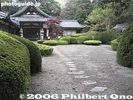
Unkoji Temple, famous for satsuki azaleas. 雲迎寺(さつき寺)Very many azalea bushes.
|
|
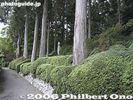
Unkoji Temple, famous for satsuki azaleas. 雲迎寺(さつき寺)
|
|

Tea bushes grown organically
|
|
|
|
|